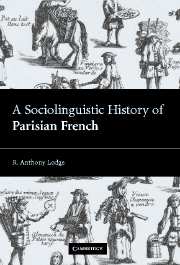Book contents
- Frontmatter
- Contents
- List of maps
- List of tables
- List of figures
- Acknowledgments
- List of phonetic symbols
- Part 1 Preliminaries
- Part 2 The pre-industrial city
- Part 3 The proto-industrial city
- 6 Social and sociolinguistic change, 1350–1750
- 7 Variation in the Renaissance city
- 8 Variation under the Ancien Régime
- 9 Salience and reallocation
- Part 4 The industrial city
- Conclusion
- Appendix Literary imitations of low-class speech
- Bibliography
- Index
7 - Variation in the Renaissance city
Published online by Cambridge University Press: 22 September 2009
- Frontmatter
- Contents
- List of maps
- List of tables
- List of figures
- Acknowledgments
- List of phonetic symbols
- Part 1 Preliminaries
- Part 2 The pre-industrial city
- Part 3 The proto-industrial city
- 6 Social and sociolinguistic change, 1350–1750
- 7 Variation in the Renaissance city
- 8 Variation under the Ancien Régime
- 9 Salience and reallocation
- Part 4 The industrial city
- Conclusion
- Appendix Literary imitations of low-class speech
- Bibliography
- Index
Summary
Proto-industrial changes in European cities had interesting and far-reaching sociolinguistic effects: in general, they induced heightened awareness of stratification in urban speech, and led eventually, in the great capitals, to language standardisation. In Paris, there was a good deal of continuity from the medieval past: permanent city-dwellers evidently continued to speak the urban variety which had been developing over the preceding centuries, and a swathe of population at the bottom of society, fed by consistently high levels of in-migration, ensured the continued presence in the city of rustic speech-forms. At the top, however, things changed more dramatically: a significant fraction of the nobility now competed for pre-eminence with the established urban elites, and increased pressure for the differentiation of an acrolectal variety. During this period, information enabling us to inject a degree of multidimensionality into our history is more plentiful than in the pre-industrial period. However, it allows us to penetrate deeper into social attitudes to language variation in the city than into socio-stylistic variation itself. We will devote this chapter to the growing awareness among Parisians of social differentiation in language, which first appears in the fifteenth century, and which becomes quite explicit in the sixteenth. We will conclude with an examination of a short text that may provide glimpses of ‘actual usage’ at this time to set against the representations of usage we consider elsewhere.
- Type
- Chapter
- Information
- A Sociolinguistic History of Parisian French , pp. 124 - 147Publisher: Cambridge University PressPrint publication year: 2004



